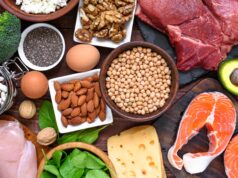Whole foods are often more nutrient-dense than processed foods, and they provide a healthier balance of nutrients. Processed food is typically high in sugar and salt, which can lead to unhealthy weight gain and other health problems.
Whole foods are better for your health than processed foods because they contain more nutrients. Saturated fats are a type of fat that is found in whole foods. Read more in detail here: what is a saturated fat?.
Nutrient dense meals, on the other hand, supply your body with nutrients such as fiber, vitamins, and minerals while being low in added sugar and fat, while energy dense foods, or high calorie foods, provide a lot of calories with little nutritional value. Processed foods are found throughout the aisles, so stay away from them.
In light of this, why are whole foods preferable to processed meals?
The vitamins and minerals included in whole meals provide our bodies with the essential basic ingredients they need on a daily basis. Whole foods are regarded “nutrient rich,” meaning they are high in a range of nutrients, while highly processed meals are thought to be high in “empty calories.”
Also, what is the difference between a processed and a natural food? The simple answer is that those entire foods have been lightly processed and retain their vitamins and minerals. The food is delivered in its natural (or almost natural) form to you.
Also, take this quiz to find out why natural foods are better for your health than processed meals.
Whole foods provide all of the vitamins and minerals that processed meals lack. Tanya follows a vegan diet, meaning she does not consume any animal products.
What exactly are whole foods, and why are they so good for you?
Benefits to your health: Eating whole foods is a great way to obtain lots of nutrients, antioxidants, and fiber in your diet, all of which may help you live a healthier life. Concentrating on complete meals such as fruits and vegetables provides less space for higher-calorie, higher-fat choices, which may aid weight loss in certain individuals.
Answers to Related Questions
Unprocessed meats are what they sound like.
Meat, both unprocessed and processed, and the risk of cardiovascular disease and diabetes Unprocessed red meat was classified as beef, lamb, or pig food in the research. Any meat preserved by smoking, curing, salting, or chemical preservatives such as nitrates was considered processed red meat.
What are some of the best non-processed foods?
Foods that are little processed, such as bagged spinach, chopped veggies, and roasted almonds, are often pre-prepared for ease of use. Canned tomatoes, frozen fruit and vegetables, and canned tuna are examples of foods that are prepared at the height of their nutritional content and freshness.
Is yogurt considered to be a processed food?
1. Yogurt from Greece. While many yogurts on the market are flavored with sweet syrups and fruit toppings, Greek yogurt, while still processed and available in individual packets and bigger containers, may be a healthy addition to a balanced diet.
Is it true that cheese is a processed food?
Processed foods are created when additives such as oil, sugar, or salt are added to foods before they are packed. Simple bread, cheese, tofu, and canned tuna or beans are all good examples. Foods that have been too processed: This is where almost half of our calories come from, and it’s where we should cut down.
Is rice considered a processed food?
Rice that is white
However, like other processed meals produced with refined wheat, such as white bread and white pasta, it provides very little nutrients in exchange for increasing blood sugar, and it may also be high in preservatives.
What are the advantages of consuming natural foods?
The whole food benefit
Lower incidences of heart disease, cancer, and type 2 diabetes are among the advantages of a whole food or minimally processed diet. Another benefit of eating mainly whole foods is the wide range of nutrients that work synergistically.
What is the definition of genuine food?
Whole, single-ingredient food is real food. It’s mostly unprocessed, devoid of chemical additions, and nutrient-dense. It is, in essence, the kind of food that humans have consumed for thousands of years. Processed foods are handy, but they are also unhealthy.
What is the best way to avoid eating processed meat?
Advice on how to stay away from processed meat
- Take a look at the label. Look for terms like nitrate, nitrite, cured, or salted in the ingredient list.
- Be a savvy shopper.
- Nitrate-free meats should be avoided.
- Processed meat portion sizes should be reduced, and you should consume less often.
- Most of the time, consume a plant-based diet, with occasional meatless days thrown in for good measure.
Which of the following is an example of a complex carbohydrate-rich food?
Complex carbs contained in whole meals, which are rich in fiber, are best for your health. Beans, oats, 100 percent whole-wheat bread, quinoa, barley, potatoes, and sweet potatoes are just a few examples. Vitamins, minerals, and phytochemicals are abundant in these foods.
Saturated fats may be present in a variety of foods.
Animal fats make up the majority of saturated fats. High-fat meats and dairy items contain them. Saturated fats may be found in the following foods:
- fatty beef, pig, and lamb chops
- poultry skin and dark chicken meat
- dairy products with a lot of fat (whole milk, butter, cheese, sour cream, ice cream)
- oils from the tropics (coconut oil, palm oil, cocoa butter)
- lard.
What foods include a lot of complex carbohydrates?
Peas, beans, whole grains, and vegetables are all high in complex carbs. In the body, both simple and complex carbohydrates are converted to glucose (blood sugar) and utilized as energy.
What is the significance of fiber in a healthy diet?
Fiber in our diet is essential for digestive health and regular bowel motions. Fibre also aids in the prevention of illnesses such as diabetes, heart disease, and colon cancer by making you feel fuller for longer. It may also improve cholesterol and blood sugar levels.
Which macronutrient is the primary energy source for cells?
Carbohydrates
What macronutrient provides the majority of the energy required for cell processes?
Proteins, lipids, and carbohydrates are the three macronutrients that provide energy or calories in the food we consume. These essential nutrients are required in huge amounts to maintain human development, metabolism, and other physiological processes, and macro implies big.
Which types of transport proteins rely on ATP for energy?
The ability of active transport proteins to utilize chemical energy to transfer a material against a concentration gradient is their distinguishing characteristic. ATP is a chemical that provides energy to most organisms, either directly or indirectly.
What are some of the nutrients that the human body needs in significant amounts?
Macronutrients are the main building elements of your food, including protein, carbs, and fat, all of which give energy to your body. Micronutrients like vitamins and minerals go a long way in tiny amounts.
Which meal is built up of numerous sugar monomer branching chains?
Glycans, or polysaccharides, are polymers made up of hundreds of monosaccharide monomers joined by glycosidic linkages. Polysaccharides include the energy-storing polymers starch and glycogen, which are all made up of branching chains of glucose molecules.
Is it true that all processed meals are bad for you?
Although not all processed foods are harmful, avoid those that include substances like trans fats, high salt and sugar content, and compounds with unpronounceable names. They’re poor in vitamins and minerals, and they may make you gain weight.
Is hamburger meat processed?
Any meat that has been altered in any way to enhance its flavor or prolong its shelf life is called processed meat. Bacon, ham, sausages, salami, corned beef, jerky, tinned meat, and meat-based sauces are examples of processed meat products.
The which food is most likely to contain all essential amino acids? is a question that has been asked by many, but it’s difficult to answer. Whole foods are healthier than processed foods because whole foods have more nutrients and less additives.
Frequently Asked Questions
Why are whole foods better for your health than processed foods quizlet?
Whole foods are more nutritionally dense, meaning that they provide a greater amount of nutrients in each serving.
What are the benefits of eating whole foods?
Whole foods are generally healthier than processed foods. They contain more nutrients, less sugar, and fewer calories.
Related Tags
- why is fiber an important part of a healthful human diet?
- why do commercial food manufacturers hydrogenate foods?
- what is the purpose of vitamins in the human body?
- what is the term for the resting energy requirement of a person who is awake but not active?
- what is the purpose of vitamins in the human body quizlet



